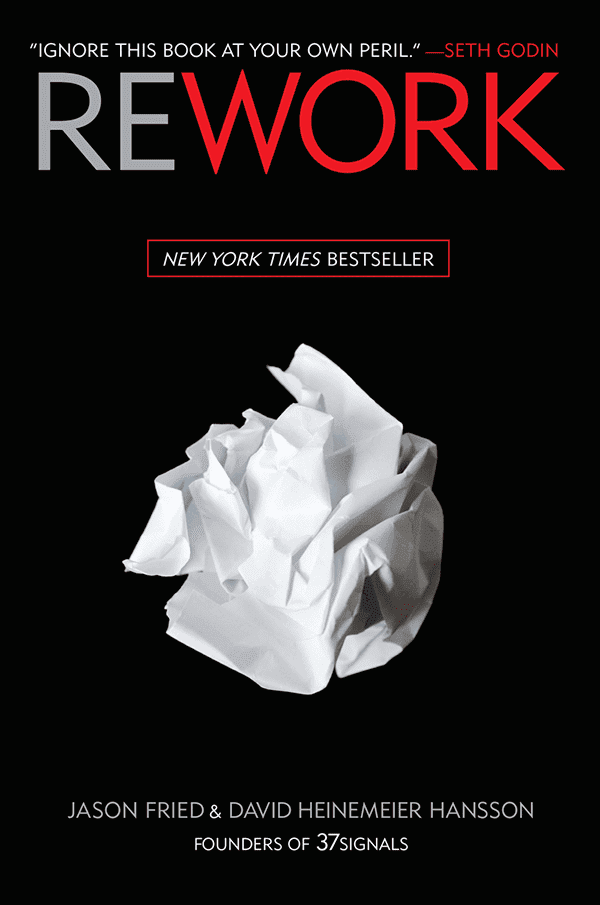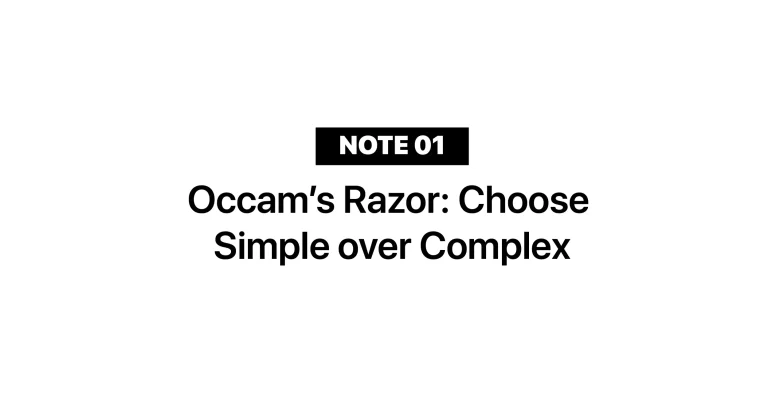
Rework by Jason Fried & David Heinemeier Hansson is a well written, concise & great book filled with insightful wisdom on changing how we work.
Post-reading it gives you a new perspective, a different angle to look at your actions, and a starter mentality.
The word “Starter” might not sound as charming as “being an entrepreneur,” but being a starter matters when endeavoring into a new beginning. For decades, humans have given titles to successful revolutionaries, founders, geniuses, artists, entrepreneurs, etc.
But they all were starters when a they first started. Nothing fancy, or grandeur.
Fun fact: “entrepreneur” is a French-derived word, so no wonder it has additional charm😃.
This was one lesson in the book, there are many others that I have listed as notes. Some I haven’t listed because it was obvious to me it might not be for you – which is why you should read the book.
Also, what I loved about Rework is that while reading it, you can read the clarity that both Jason & David have. There is no fluff or attempt to explain something simple by exaggerating it. And the graphics were on point.
No wonder the 37 signal is excellent at building good products.
However, I wish there could be more examples & details on some topics like “How to build Epicentre” & “How to build concrete Substances.”
But overall, it’s a great novel filled with wisdom & thought provoking points, written by someone with practical knowledge of building and scale.
I would give Rework around 8/10.
Please Note
Below I have added my notes, highlights, images & book quotes straight from the book.
In some areas (very rarely) I have also added my opinions, drawings, others links, etc. I have also omitted certain points that seemed obvious/fluff to me. Which might be crucial for you.
Enjoy!
Notes of Rework by Jason Fried & David H. Hansson
Chapter One – Takedown
- Deep down, people who often say, “This won’t work,” are nothing but pessimists. And worst, they will try to convert you also.
- Learning from failure is overrated – pivot by starting to learn from success.
- 9/10 business fail, but it shouldn’t stop or impact you to start something. It’s others failure, not yours.
- Failure is not a prerequisite for success. Success is the only experience that counts.
- Planning is nothing but guessing. The past drives planning, and ironically, the past also holds you back.
- Sometimes, all you have to do is to start moving. And do what makes sense today.
- You have the most knowledge and insights with you when you start working, not while planning.
- Stop planning for next year; plan what you will do this week.
- Working without a plan is scary, but mindlessly following a plan not rooted in reality is stupid. Choose Scary over stupidity.
- Small business gives you the power to grow faster.
- Workaholism doesn’t mean more work is getting done; it only means you are working more.
- Workaholics & perfectionists, rather than helping, actually do more harm by working and perfecting small things and details rather than moving ahead to the next task.
- Rather than becoming an Entrepreneur, it’s much better to become a starter.
Chapter Two – Go
- Doing Good Work is all about making your customer’s life better than before.
- You don’t have to be a big player or create something revolutionary; be someone who brings something fresh and new from the old model/process.
- Look for a problem you are facing or something you need the most; create that.
- What you do and your actions matter, not what you plan or say.
- As a beginner, it’s crucial to start creating, as ideas are cheap and plentiful.
- Time should not be the excuse, as those who want always make the time for it. Often, people protect their egos with this excuse.
- Great businesses have good Points of view, not just superb products or services. For that, you need to remember why and what you are doing.
- If no one hates you, there is a chance that you are either not pushing hard enough or boring.
- Your mission statement should align with reality. Stand with something that you believe in.
- Don’t look for outside money; today, you don’t need much money to start, form, and earn from business.
- Great business can be made from less money and with less time. Be frugal and efficient.
- Start a business that has the potential to earn profit.
- More than an exit strategy, you should have a commitment strategy.
- Focus on making your project (or business) succeed, not flip it.
- Be agile.
Chapter Three – Progress
- Constraint is an advantage in disguise. The less you have, the more opportunity is there to be creative.
- Many things get better as they get shorter; focus on a few things and ditch many things.
- Find out what your Epicenter is; like for hot dog sellers, what is most important is HOTDOG; all the other things are secondary.
- Detail matters, but not at the early stage; focusing too much on the details at the early stage does nothing but waste your time.
- Make a decision & move forward – don’t wait for the perfect solution. Instead, get in the rhythm of making choices.
- Planning for long doesn’t work because there are always things that will come.
- Excellent museums are not built by putting all the art in the world – that’s Warehouse. It’s made when a person edits and focuses on what stays and does not. Be like that; be a curator.
- Constantly look for things that don’t matter or make any impact and start ditching them.
- Start trimming the Menu; even Gordan Ramsay starts with the same in Kitchen Nightmare.
- Build your business with concrete Substances that won’t change compared to new trends that will continually change.
- Put little focus on “tools” and instead focus on execution.
- Launch your product when it’s ready to do what it needs “to do.” But don’t compromise by skipping or ditching essential qualities; the main idea is not to get carried away in perfecting the product. JUST START.
Chapter Four – Productivity
- Don’t say “Yes” to many things; instead, make your default choice as No. We get overwhelmed with too many things.
- Customers are not always correct, so don’t take feedback or review by heart. The feedback that you need will be repeated to you often.
- Don’t make your product or service central around one customer’s preference.
- Don’t confuse enthusiasm with priority. When we are enthusiastic, we forget what’s important.
- Being great at a few things doesn’t look attractive, but in reality, it’s great.
Chapter Five – Competitors
- To learn fundamentals, process and why behind it – it’s good to copy as a student.
- If you are only copycatting your way, you will never keep up.
- Be inspired, but don’t steal. This way you will always be passive learner.
- Decommoditizeyour product, add something unique in your product.
- Pick a fight, be anti this shows that you stand with something.
- Focus on yourself, instead of your competitors. What you are doing is way more important than what your competitor does. You can’t control them.
Chapter Six – Evaluation
- Don’t say “Yes” to many things; instead, make your default choice as No. We get overwhelmed with too many things.
- Customers are not always correct, so don’t take feedback or review by heart. The feedback that you need will be repeated to you often.
- Don’t make your product or service central around one customer’s preference.
- Don’t confuse enthusiasm with priority. When we are enthusiastic, we forget what’s important.
- Being great at a few things doesn’t look attractive, but in reality, it’s great.
Chapter Seven – Promotion
- If no one knows you, it’s great because you are in the shadow to make mistakes and try new experiments without worrying about protecting your Ego or confidence.
- It’s better not to tell the world that you are starting a new business as it makes you conservative and stops you from taking significant risks, which is not good.
- Build inbound, build an audience. Having an audience makes you quickly deliver your message.
- Don’t buy people’s attention; let them give it to you.
- Instead of selling, shift your focus on teaching; the audience will trust and respect you.
- There are many Chefs out there, but we only know a few like Julia Child, Gordan Ramsay, etc., because they have written books, which means they shared their learning.
- Don’t be afraid to show your flaws; people respond to real.
- It’s okay not to be seen as a professional, but you should always be seen as genuine.
- Focus your attention on small players while promoting those passionate about new things.
- Learn from Drug Dealers that they offer their product for free because they know people will come looking for them. They trust their product.
- Everything you do is marketing; it’s not just a department, job, or you allocate time to it.
- Trade overnight sensation dreams for slow and measured growth.
Chapter Eight – Hiring
- Only hire a person after doing it yourself. It would make you a much better manager.
- Resumes are scams; instead, look at the cover letters.
- Years of experience don’t matter that much. There is little difference between 6 months and 1 year of work ex; the real edge comes from personality, dedication, and intelligence. Look for these.
- Hire people who are self-starters and managers. It makes less of a burden for you as you don’t have to oversight them.
- Hire great writers, as having clear writing is a sign that someone thinks well and puts themselves in someone else shoes.


